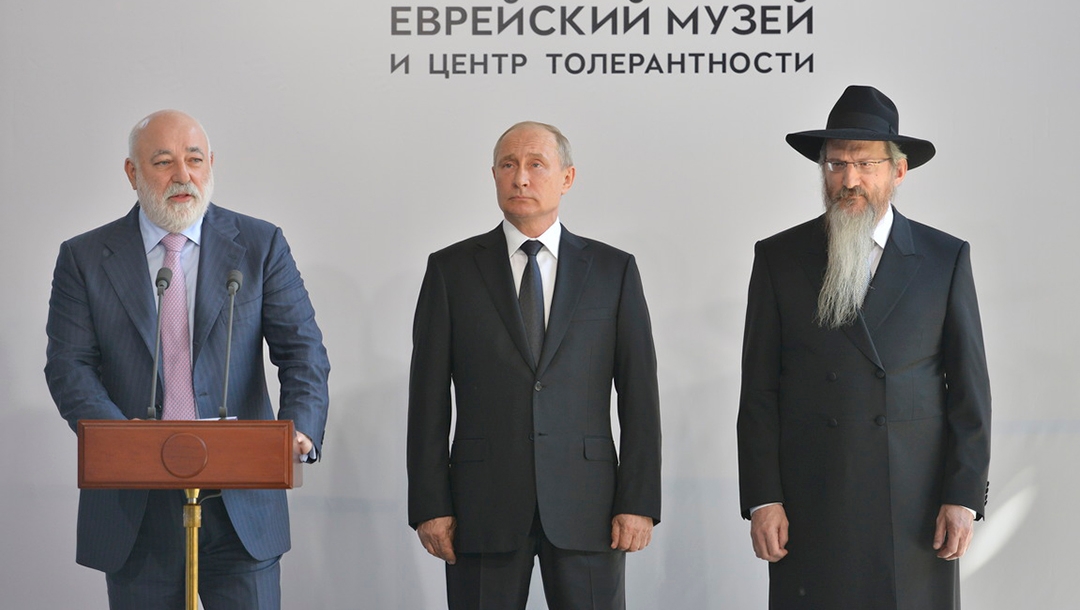(JTA) — A Russian official has apologized after his deputy published an op-ed that referred to the Chabad-Lubavitch movement of Orthodox Judaism as a “neo-pagan cult” striving for “global domination.”
Top leaders of Chabad in Russia, who have been navigating a fine line in their relationship with the government during the country’s war on Ukraine, criticized the column published last week in a state magazine as antisemitic.
Russian chief rabbi, Berel Lazar, who is part of Chabad, called the column “a piece of vulgar antisemitism.” His top deputy warned that the column heralded “a new era in Russia’s relations with Jews.”
In the column, published in the Argumenty i Fakty weekly newspaper, Aleksey Pavlov, secretary of the Security Council of Russia, a government committee of experts, spoke of the need to perform “desatanization” in Ukraine, which Pavlov claimed had hundreds of neo-pagan cults. He included “the Chabad-Lubavitch sect,” as he called it, on a list of various religious groups that he said proved his point.
Nikolai Patrushev, a high-ranking official for the security council, said in a statement issued Friday that the column did not represent an official government position.
“I apologize for the op-ed, which contained several erroneous statements about the followers of Chabad-Lubavitch,” read the statement. “This interpretation represented only Alexey Pavlov’s personal point of view and in no way represents that of the Security Council of Russia. Talks have been had with the writer of the op-ed.”
The episode is notable because of the force with which Jewish leaders inside and outside Russia responded. Since Russia invaded Ukraine in February, Chabad’s leaders in Russia have walked a fine line amid a crackdown on free speech in the country. They refrained from the open embrace that many other religious leaders showed — and that Moscow’s former chief rabbi, who was not part of Chabad, said he faced pressure to demonstrate before he fled the country. Instead, they have expressed displeasure about the war while not denouncing Russian president Vladimir Putin and while continuing to serve Russian Jews, even as tens of thousands of them have left amid deteriorating conditions there.
As Putin’s war has sputtered, signs of open antisemitism have crept into public discourse, including in state media, a worrying shift in a country where oppression of Jews and, at times violence against them, was policy for many decades until recently. The rare apology by a Russian public official suggests that the perception that antisemitism is government policy is unwelcome.
The Orthodox rabbi who left the country, Pinchas Goldschmidt, renewed his call for Russia’s Jews to leave the country after the attack on Chabad last week. “An attack by the Russian government against Chabad, as well as the attacks against the Jewish Agency for Israel, are antisemitic acts against all of us,” he said, referring to a government case against the organization that facilitates emigration to Israel for Russian Jews.
That message resonated beyond Russia. Ronald Lauder, president of the World Jewish Congress, also issued a statement condemning the criticism of Chabad.
“Alexi Pavlov’s remarks accusing Chabad of being a neo-pagan cult in search of world-domination can be categorized as nothing other than antisemitism — Jew hatred — in its purest and ugliest form,” said Lauder, who said Lazar was a longtime friend. “Chabad is an integral part of the global Jewish community. Any disparaging attack on Chabad and the Chabad community in Russia, let alone an attack that amounts to blood libel, is an attack on the Jewish people as a whole.”
JTA has documented Jewish history in real-time for over a century. Keep our journalism strong by joining us in supporting independent, award-winning reporting.






